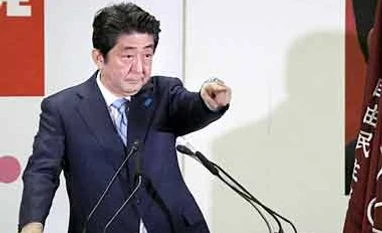The impact of the 2008 financial crisis continues to be felt in the developed world. For the fifth time in seven years, Japan has slipped into recession, the second time since Prime Minister Shinzo Abe took office in December 2012. In economic parlance such a recession is called a ‘quintuple dip’.
Japan’s gross domestic product (GDP) declined an annualized 0.8% for the quarter ended September 2015, following a revised 0.7% drop in the June quarter, thus meeting the technical definition of a recession. Economists had estimated a 0.2% decline for the third quarter.
The recent data point raises questions about the much-touted Abenomics. After Shinzo Abe's was elected as Japan's prime minister two years ago, economists coined the term ‘Abenomics’, which is essentially his three-part plan of rescuing Japan’s economy from a treadmill of stagnation and deflation.
Japan’s latest GDP numbers does not seem to reflect the benefit of Abenomics’ arrows. But there is some hope in the details of the GDP numbers.
"A big drop in inventory was the largest factor behind a third-quarter contraction. Weak capital spending was a concern, but excluding these factors, the GDP figures were not so bad," said Takeshi Minami, chief economist at Norinchukin Research Institute.
Capital expenditure fell 1.3%, more than a median market forecast of a 0.4% decrease to mark a second straight quarter of declines, on sluggish investment by automakers and machinery manufacturers. But private consumption, which accounts for about 60% of GDP rose 0.5% from the previous quarter, roughly in line with a median market forecast.
But the outlook for the Japanese economy remains weak. Many analysts expect the economy to grow only moderately in the current quarter as companies remain hesitant to use their record profits for wage rises.
“This report shows the increasing risk that Japan’s economy will continue its lacklustre performance,” said Atsushi Takeda, an economist at Itochu Corp. in Tokyo. “The weakness in capital spending is becoming a bigger concern. Even though their plans are solid, companies aren’t confident about the resilience of economy at home and abroad.”
The market expects Prime Minister Abe and Bank of Japan (BOJ) to do more to prop up the Japanese economy. “The BOJ should act now if they are looking at economic fundamentals: prices are falling and economy isn’t growing, giving no sign for inflation expectations to rise,” said Itochu’s Takeda.
Hiroaki Muto, chief economist at Tokai Tokyo Research Center Co., said that while he thinks the economy “might have hit the bottom” in the third quarter, there’s a strong chance that the government will compile an economic package to shore up growth.
Japanese stimulus will be keenly followed by the market as Federal Reserve meeting to increase interest rates is approaching fast. Mario Draghi had recently commented on the on-going poor state of the European economy. With even the Japanese economy under stress Fed’s action can have a bigger impact on the global economy.
Japan’s gross domestic product (GDP) declined an annualized 0.8% for the quarter ended September 2015, following a revised 0.7% drop in the June quarter, thus meeting the technical definition of a recession. Economists had estimated a 0.2% decline for the third quarter.
The recent data point raises questions about the much-touted Abenomics. After Shinzo Abe's was elected as Japan's prime minister two years ago, economists coined the term ‘Abenomics’, which is essentially his three-part plan of rescuing Japan’s economy from a treadmill of stagnation and deflation.
More From This Section
Abenomics' three components – or ‘arrows’ – comprise monetary stimulus in the form of quantitative and qualitative easing (QQE), but unlike other QEs seen in Europe and the US, Japan’s included giving more credit to the private sector too; a short-term fiscal stimulus, followed by consolidation to reduce deficits and make public debt sustainable; and finally, structural reforms to strengthen the supply side and potential growth.
Japan’s latest GDP numbers does not seem to reflect the benefit of Abenomics’ arrows. But there is some hope in the details of the GDP numbers.
"A big drop in inventory was the largest factor behind a third-quarter contraction. Weak capital spending was a concern, but excluding these factors, the GDP figures were not so bad," said Takeshi Minami, chief economist at Norinchukin Research Institute.
Capital expenditure fell 1.3%, more than a median market forecast of a 0.4% decrease to mark a second straight quarter of declines, on sluggish investment by automakers and machinery manufacturers. But private consumption, which accounts for about 60% of GDP rose 0.5% from the previous quarter, roughly in line with a median market forecast.
But the outlook for the Japanese economy remains weak. Many analysts expect the economy to grow only moderately in the current quarter as companies remain hesitant to use their record profits for wage rises.
“This report shows the increasing risk that Japan’s economy will continue its lacklustre performance,” said Atsushi Takeda, an economist at Itochu Corp. in Tokyo. “The weakness in capital spending is becoming a bigger concern. Even though their plans are solid, companies aren’t confident about the resilience of economy at home and abroad.”
The market expects Prime Minister Abe and Bank of Japan (BOJ) to do more to prop up the Japanese economy. “The BOJ should act now if they are looking at economic fundamentals: prices are falling and economy isn’t growing, giving no sign for inflation expectations to rise,” said Itochu’s Takeda.
Hiroaki Muto, chief economist at Tokai Tokyo Research Center Co., said that while he thinks the economy “might have hit the bottom” in the third quarter, there’s a strong chance that the government will compile an economic package to shore up growth.
Japanese stimulus will be keenly followed by the market as Federal Reserve meeting to increase interest rates is approaching fast. Mario Draghi had recently commented on the on-going poor state of the European economy. With even the Japanese economy under stress Fed’s action can have a bigger impact on the global economy.
)